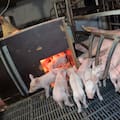Some farmers say it's the "toughest season in a generation" as the perfect storm of challenges mount for the sector.
Drought was declared across large parts of the South Island this week, which comes on top of high interest rates and a softening export market.
Tasman farmer Sam Higgins says it was not unusual for his paddocks in Wakefield to be dry during summer but to have no rain heading into winter was concerning.
"We are getting to dire stages," Higgins said. "You normally have one or two (challenges) but it's all starting to compound".
Soaring inflation while prices at the gate tumble
Inflation has hit the sector hard with prices on fertiliser, diesel and wages soaring in recent years.
It was particularly tough for sheep farmers who are also facing a downturn in exports with China not taking as much lamb and Australia flooding the market with cheap meat.
"Just prior to Christmas, we were selling ewes for a $180, this year we got $70," Higgins said.
ANZ agriculture economist Susan Kilsby says it was unlikely that the export situation would change in the coming year.
"In terms of beef and dairy the returns there are more around break even prices but for lamb farmers, or sheep farmers, very difficult to make a profit this year."
In 2021, sheep meat exports were worth $4.1 billion, which jumped to $4.3 billion the following year. Last year exports were worth $3.7 billion — a drop of more than $600 million for the sector.
Beef + Lamb chair Kate Acland didn't mince words describing this year as "the toughest season in a generation".
'So much coming at them this year'
She said the number of challenges facing the sector was unusual. "A lot of our farmers are used to dealing with drought but there's so much coming at them this year that it's really tough".
While a recent Federated Farmers survey found an uptick in optimism after the change in government, the situation was still grim.
"There is an enormous amount of stress out there in rural New Zealand and we've seen that farmers have got their head down and just want to keep farming," Acland said.


















SHARE ME